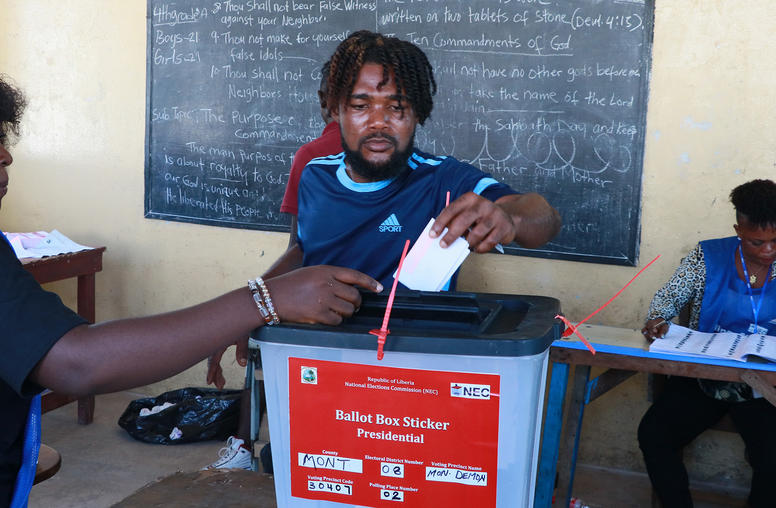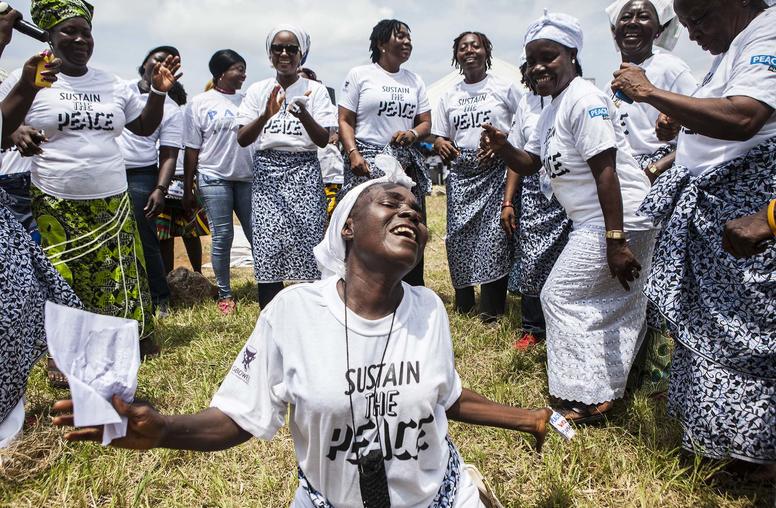In December 2009, Deborah Isser and Tim Luccaro traveled to Monrovia, Liberia to present the findings of the recent USIP Peaceworks, "Looking for Justice: Liberian Experiences with and Perceptions of Local Justice Options," to senior government officials, and to facilitate a meeting between Liberia's Legal Working Group and the nation's traditional leaders.
By Tim Luccaro
Posted: January 22, 2010
It had been nearly 18 months since my last trip to Liberia. And, as soon as we stepped off of the plane last December the cloak of heat bore down upon my shoulders, the smell of hot peppers and smoke from open fires permeated the heavy air, and I was instantly brought back to my time living here in 2008.
 On my 2009 trip, I joined senior Rule of Law Adviser Deborah Isser and George Washington Professor of Anthropology Stephen Lubkemann as they traveled to Monrovia to present the findings of their November 2009 USIP Peaceworks, “Looking for Justice.” Throughout our week in country, I quietly observed as the authors met with the minister of justice, minister of internal affairs, the chief justice of the supreme court and the head of the government's law reform commission. My reason for returning to Liberia was to spend two days facilitating a meeting between a group known as the Liberian Legal Working Group and the nation’s traditional leaders.
On my 2009 trip, I joined senior Rule of Law Adviser Deborah Isser and George Washington Professor of Anthropology Stephen Lubkemann as they traveled to Monrovia to present the findings of their November 2009 USIP Peaceworks, “Looking for Justice.” Throughout our week in country, I quietly observed as the authors met with the minister of justice, minister of internal affairs, the chief justice of the supreme court and the head of the government's law reform commission. My reason for returning to Liberia was to spend two days facilitating a meeting between a group known as the Liberian Legal Working Group and the nation’s traditional leaders.
One Country, Many Justice Options
USIP first began its work in Liberia in the wake of the nation’s civil war that ended in 2003. The project spent 10 months conducting in-depth interviews throughout the country, examining the role that different justice systems – formal, customary and other – play in the lives of everyday citizens.
Like many other developing nations, Liberia has more than one system of justice operating simultaneously. The formal justice system refers to state-sanctioned legal actors, such as courts and prosecutors, that receive the lion’s share of attention from international agencies. It tends to be the one that most people are familiar with. The customary or traditional justice system often operates without state sanctioned authority and is based on culturally prescribed norms and values.
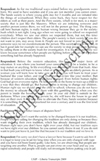 Capitalizing on the local knowledge and language abilities of an exclusively Liberian research team, USIP compiled thousands of pages of vivid transcripts documenting the ways in which average Liberians choose to navigate their dispute resolution landscape. Researchers allowed individuals to trace the course of their disputes as they maneuvered in and out of different resolution forums. From heartbreaking stories of rape and murder, to inspiring instances of reconciliation and forgiveness between the aggrieved, the USIP transcripts share Liberians’ justice experiences and perceptions in their own words.
Capitalizing on the local knowledge and language abilities of an exclusively Liberian research team, USIP compiled thousands of pages of vivid transcripts documenting the ways in which average Liberians choose to navigate their dispute resolution landscape. Researchers allowed individuals to trace the course of their disputes as they maneuvered in and out of different resolution forums. From heartbreaking stories of rape and murder, to inspiring instances of reconciliation and forgiveness between the aggrieved, the USIP transcripts share Liberians’ justice experiences and perceptions in their own words.
The main takeaway from the transcripts, and subsequent Peaceworks report “Looking for Justice,” is that the preferred option for dispute resolution in Liberia - be it for petty theft or egregious acts of violence – is through nonstate mechanisms and actors.
Liberia’s Legal Working Group & Evidenced Based Policy
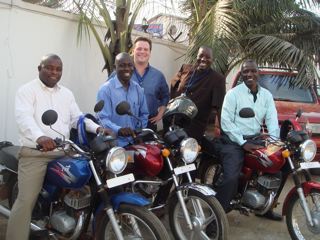 From the outset, the ultimate aim of the research was to inform policy reform. In particular, the project sought to engage the legal establishment that had little contact or understanding of justice as practiced outside the capital.
From the outset, the ultimate aim of the research was to inform policy reform. In particular, the project sought to engage the legal establishment that had little contact or understanding of justice as practiced outside the capital.
In that regard we felt it was crucial to take our research to the highest levels of government, and share our findings with as broad a subset of the Liberian policy community as possible.
Throughout USIP’s time in Liberia we have continuously briefed the government and other relevant actors on our findings, hoping this would enable them to create policy grounded in empirical research.
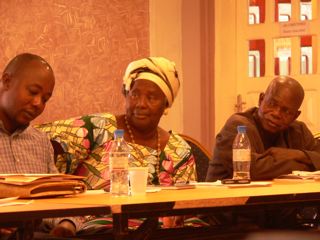 USIP’s research and guidance directly contributed to a working group – the Liberian Legal Working Group – that started in 2008, when reform-minded lawyers from the Ministries of Justice and Internal Affairs, along with members of the judiciary, the bar association, the law school and various nongovernmental organizations asked USIP, the United Nations Mission in Liberia (UNMIL), and the Carter Center to help convene the Legal Working Group. Over the course of seven meetings throughout 2009, the group grappled with the key legal and policy questions concerning Liberia’s dual justice system.
USIP’s research and guidance directly contributed to a working group – the Liberian Legal Working Group – that started in 2008, when reform-minded lawyers from the Ministries of Justice and Internal Affairs, along with members of the judiciary, the bar association, the law school and various nongovernmental organizations asked USIP, the United Nations Mission in Liberia (UNMIL), and the Carter Center to help convene the Legal Working Group. Over the course of seven meetings throughout 2009, the group grappled with the key legal and policy questions concerning Liberia’s dual justice system.
Our December 2009 trip served as a culmination of the Legal Working Group’s work, and allowed us to spend an entire day helping the group reach a final consensus on the aforementioned issues. With USIP’s help, the group drafted a statement of fact outlining how Liberian statutes currently oversee the integration of the formal and customary legal systems.
Simply finding copies of Liberia’s laws can be a daunting task in and of itself, as highlighted in a recent article “He’s Got the Law (Literally) in His Hands,” by Jina Moore and Glenna Gordon in Foreign Policy’s November 2009 edition. So establishing the legal framework of the dual system was no easy feat.
The policy recommendations derived from the group’s statement of fact would be sensitive to Liberians’ understandings of and demands for justice.
Failures of the State System
The group recognized that policymakers needed to be pragmatic in their approach to alleviating the historic and current shortcomings of the formal justice system. They all accepted that the entire judicial process continues to be plagued by rampant corruption and inaccessibility, which have contributed over the decades to the erosion of confidence amongst the Liberian populace.
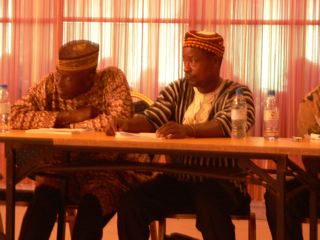 The Legal Working Group agreed that the customary system needs to fill Liberia’s gaping justice vacuum – a member of the bar association noted that nearly 96 percent of people in detention have yet to face trial.
The Legal Working Group agreed that the customary system needs to fill Liberia’s gaping justice vacuum – a member of the bar association noted that nearly 96 percent of people in detention have yet to face trial.
In addition to the formal system’s shortcomings, people’s confidence in the customary system further strengthened calls from the Legal Working Group for its continued integration or harmonization by the state. One lawyer actually drew open the USIP Peaceworks and quoted from the opening page, “Most Liberians would still be unsatisfied with the justice meted out by the formal system, even if it were able to deliver on the basics.” The group understood that Liberians demand justice that is accessible, affordable, transparent, expeditious and imbued with local principles of reconciliation and restoration.
Sassywood and Other Trials by Ordeal
Despite such progress, the Legal Working Group continued to struggle throughout the first day with how to reconcile the international pressures brought by human rights advocates against traditional practices known as trial by ordeal with the justice demands and expectations of the local population.
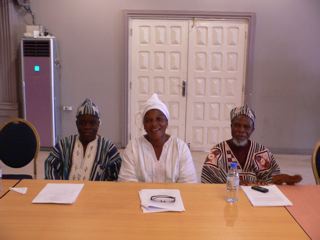 Nearly every county in Liberia has different local practices that traditional authorities employ to determine a person’s culpability, or use to punish culprits for transgressions committed within a community. The group recognized that certain practices - like the act of sassywood, in which individuals are forced to ingest a poison in order to determine their innocence or guilt are repugnant.
Nearly every county in Liberia has different local practices that traditional authorities employ to determine a person’s culpability, or use to punish culprits for transgressions committed within a community. The group recognized that certain practices - like the act of sassywood, in which individuals are forced to ingest a poison in order to determine their innocence or guilt are repugnant.
One member also noted, though, that, “While there are certainly onerous methods of trial by ordeal that deserve restriction, they are not necessarily representative of the entire spectrum of traditional behaviors.” There are a range of benign trial by ordeal practices that have been subjected to recent government interventions on behalf of rights activists. Without distinction, the government policy has been to outlaw all forms of trial by ordeal. While this has clearly been desirable from human rights perspectives, empirical evidence has shown that the blunt instrument of a blanket ban has had adverse consequences and deteriorated the state’s legitimacy in the minds of many Liberians.
In the subsequent day of meeting with the Legal Working Group, many of the concerns regarding trial by ordeal would resurface.
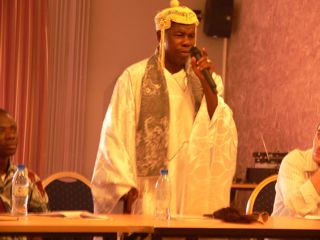 In the fried chicken infused air of a local rib joint, the legal working group was expanded to include other members of the policy community, along with representatives of Liberia’s Traditional Leadership Council.
In the fried chicken infused air of a local rib joint, the legal working group was expanded to include other members of the policy community, along with representatives of Liberia’s Traditional Leadership Council.
The council, under the leadership of Chief ZahZah Kawor, represents the interests of Liberia’s traditional authorities at the national level and acts as their voice in state policymaking. During the meeting with the Legal Working Group, the traditional leaders shared their rationale for why they continue to practice trial by ordeal despite government prohibition.
In their view, witchcraft continues to destabilize their communities – being cited as the underlying source of wrongdoing in cases as varied as death and dismemberment to theft and adultery.
The traditional authorities lamented that the one tool they had historically been able to employ to prevent and treat cases of witchcraft was trial by ordeal. Rendered impotent by the state’s blanket ban, the authorities, along with their constituents, questioned the motivations behind the federal government’s policy. According to their logic, if the government is the force behind the outlawing of the only means that local people have to treat growing instances of witchcraft, then they must be benefiting from that ban – and, as such, may be considered a part or party to the malevolent cults that are destabilizing Liberia’s rural communities. In essence, the government’s trial by ordeal policy is undercutting its very legitimacy in the eyes of its citizenry.
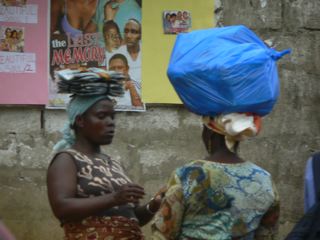 The traditional leaders echoed the sentiments of those found in USIP’s report. They said they were willing to change many of their traditional behaviors and acknowledged many of the merits of development – but emphasized that such change could not happen overnight. They feared no one was listening to their concerns, or appreciating that the practices they choose to invoke are not the vestiges of some antiquated cultural belief, but the product of a rational effort to make the most of the economic and social positions they inhabit.
The traditional leaders echoed the sentiments of those found in USIP’s report. They said they were willing to change many of their traditional behaviors and acknowledged many of the merits of development – but emphasized that such change could not happen overnight. They feared no one was listening to their concerns, or appreciating that the practices they choose to invoke are not the vestiges of some antiquated cultural belief, but the product of a rational effort to make the most of the economic and social positions they inhabit.
The Legal Working Group listened to the traditional leaders concerns, and emphasized that their document would provide policymakers with a better understanding of the issues as they are faced and perceived by the people in their everyday lives.
Then policymakers could make informed decisions that are reflective of not only external demands but accountable to those who are subjected to the laws and statutes they are enacting.
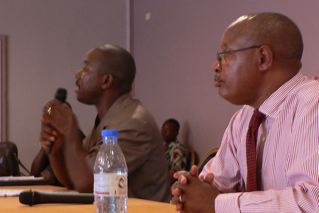 Throughout the second day’s proceedings, two Liberians presented the document to the assembled group and opened the floor for discussion. It was exhilarating to listen as they expertly translated the document from its stilted policy jargon into the flowing, syncopated rhythms of Liberian English. They explained that the aim was to harmonize the rights embodied in “the Big Big Law Book” (the Constitution) with the social realities and justice demands of the Liberian people.
Throughout the second day’s proceedings, two Liberians presented the document to the assembled group and opened the floor for discussion. It was exhilarating to listen as they expertly translated the document from its stilted policy jargon into the flowing, syncopated rhythms of Liberian English. They explained that the aim was to harmonize the rights embodied in “the Big Big Law Book” (the Constitution) with the social realities and justice demands of the Liberian people.
Ultimately, the entire group was able to ratify the document that had been drafted by the Legal Working Group and confirmed their shared vision to begin a process of judicial reform that accounted for the full landscape of justice options available to the Liberian people.
The resulting document lays out the empirical and legal landscape that policymakers must account for as they draft up legislation addressing justice reform. In addition, the document provides legislators with key policy questions they need to address as it relates to the dual system, providing a menu of possible options that they might consider as they draft legislation and develop policies regarding the integration or harmonization of the two systems.
In the coming months the group will hold a broader national conference under the auspices of the ministries of justice, internal affairs and judiciary to develop a concrete action plan for improving the quality of justice for all Liberians. The national conference is tentatively scheduled for late February 2010.

